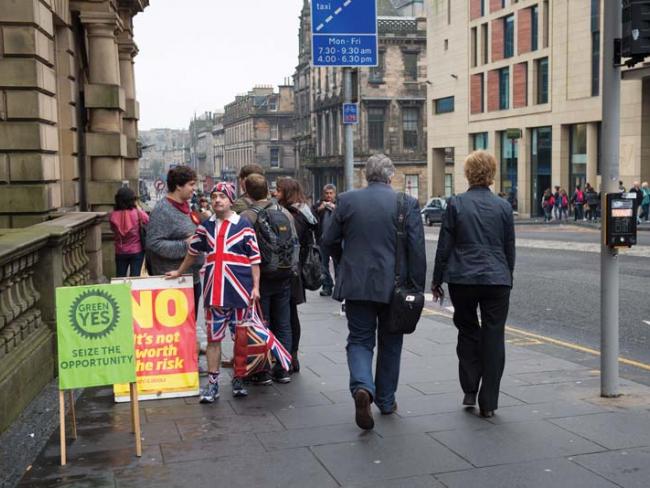More of a nightmare
The Dream Shall Never Die: 100 Days That Changed Scotland Forever, by Alex Salmond, hardback, 263 pages, ISBN 978-0008139766, William Collins, 2015, £12.99.
This is the SNP’s Alex Salmond’s diary of the last hundred days of the Scottish referendum campaign last year.
He claims, “Where we do have tremendous support is in the breadth of the business community…Our list of business supporters, led by Brian Souter, Jim McColl and George Matthewson, is impressive.”
Souter is the boss of a private bus company. A month after he gave the SNP £500,000, the party dropped its commitment to re-regulate the bus network. McColl is so committed to Scotland that he is a tax exile in Monaco. Matthewson backed the disastrous 2007 takeover by RBS of ABN Amro, whose debts killed off the Scottish bank.
The SNP worked with the Tories at Holyrood for four whole years, relying on them to pass all its annual budgets. The Labour Party worked with the Tories for just a hundred days in the Better Together
campaign. Salmond tactfully never mentions the first fact, but never fails to mention the second.
Salmond says essentially vote SNP to get the Tories out. But certainly for workers, the SNP is just as great a threat as the Tories, for they are determined to break up Britain and will pursue that in Parliament. Scottish workers who opposed separation in the referendum – a handsome majority – might be able to help spoil such a plan by tactical voting to keep the SNP out.
Salmond writes of “Scotland’s spending advantage”, admitting that what he calls the “three other nations” (three? – he must want to break up Ireland permanently as well as Britain!) have a “public spending advantage” over England – which shoots down the usual SNP claim that Scotland subsidises England.
Just like the Labour Party, Salmond and the SNP oppose a democratic referendum on EU membership. And Salmond endorses the SNP’s undemocratic proposal that, if a referendum is held, there should be a triple lock on any referendum decision. There would have to be majorities in England, Scotland, Wales and northern Ireland separately for Britain to leave the EU. The result would not be decided by majority vote but by minority rule. ■
Campaign perspective
100 days of hope and fear: how Scotland’s referendum was lost and won, by David Torrance, paperback, 192 pages, ISBN 978-1910021316, Luath Press Ltd, 2014, £9.99.
David Torrance is a journalist and author. Throughout last year’s Scottish referendum campaign he tried to keep an objective stance, as befits a journalist, rejecting attempts to put him into one camp or the other. In this fascinating account he gives us a flavour of the campaign’s lively meetings and intense debates. He also makes some sharp comments on some of the ideas expressed in the campaign.
The Scottish National Party’s policy of secession would damage all of us. The SNP rejects Union with England and Wales in which it has ten per cent of the population and a commensurate say. Yet it embraces the EU in which it would have around one per cent of the population and a commensurately smaller say. And why leave a successful Union in order to join an unsuccessful one?
Secession would destroy both national solidarity and working class unity. The SNP claims that dividing us would unite us, on the spurious grounds that a breakaway Scotland would provide an irresistible progressive example which England and Wales would soon follow. Torrance rejects this, and observes that in fact two small rump states would more likely retreat into reaction, evidenced by the lack of progress in the Czech Republic and Slovakia since their split.
Torrance points out that the SNP agreed to accept the referendum outcome as required by the agreement between the United Kingdom government and the Scottish government signed in Edinburgh on 15 October 2012. It stated, “... the governments are agreed that the referendum should: ...be conducted so as to command the confidence of parliaments, governments and people, deliver a fair test and a decisive expression of the views of people in Scotland and a result that everyone will respect.”
The vote was 55-45 against secession – a clear, fair and decisive result that we should all respect.

